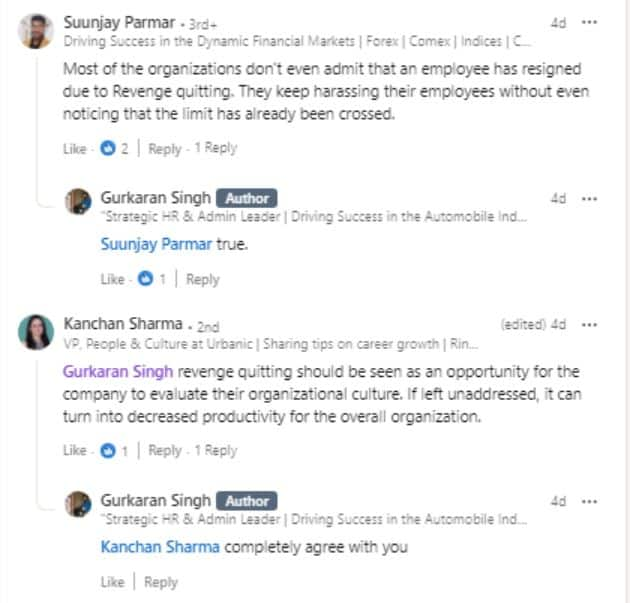Indore-Based HR Explains 'Revenge Quitting' Trend In Corporate Offices – Viral Post Sparks Debate
Employees are making sudden, dramatic exits as a form of protest, and an Indore-based HR expert sheds light on why this trend is on the rise.
- "Revenge Quitting is the biggest trend now"
- Key reasons behind revenge quitting, including broken promises, toxic work environments, and more
- According to Singh, employees who feel undervalued or exploited often see sudden resignation as a way to take control
Trending Photos
) Pic Credit: Freepik
Pic Credit: Freepik In a now-viral LinkedIn post, an Indore-based HR expert shed light on the rising trend of 'revenge quitting'—a phenomenon where employees make sudden, dramatic exits as a form of protest against workplace culture.
What is 'Revenge Quitting'?
An Indore-based Human Resources (HR) and administration expert, Gurkaran Singh, recently took to LinkedIn to explain this growing trend.
"Revenge Quitting is the biggest trend now," Singh stated. "It is a dramatic exit—an abrupt, emotionally charged resignation driven by frustration."
While 'quiet quitting' is about disengagement without actually leaving, 'revenge quitting' is its opposite—a resignation meant to send a message. "It's when an employee decides, 'They will regret losing me'," Singh elaborated.
Why Are Employees Quitting This Way?
Singh identified several key reasons behind revenge quitting, including broken promises, toxic work environments, excessive micromanagement, and even a single harsh email.
"Overwork without recognition, favoritism, and an abusive statement on the office floor—anything can push an employee over the edge," he noted.
According to Singh, employees who feel undervalued or exploited often see sudden resignation as a way to take control and make their dissatisfaction known.
A Warning for Employers
Singh warned that ignoring employee well-being is a risky move. Companies that neglect their workforce's concerns may find themselves dealing with unexpected resignations and the loss of valuable talent.
His advice to corporate leaders? "Listen, engage, and act before it's too late!"

Social Media Reacts
Singh's post has sparked a widespread discussion online, with many professionals agreeing with his perspective.
"Employees leave when they feel unheard and undervalued," one LinkedIn user commented. Another added, "Revenge quitting is a wake-up call. Employees don't just leave jobs; they leave broken trust, toxic environments, and unfulfilled promises."
A third user stated, "Most organizations refuse to admit that revenge quitting is real. They keep pushing employees past their limits and wonder why people leave without notice."



As workplace dynamics continue to evolve, Singh’s viral post highlights the urgent need for organizations to rethink their approach to employee satisfaction. With revenge quitting on the rise, companies that fail to foster a positive work environment may face the consequences—losing talent in the most dramatic way possible.
Stay informed on all the latest news, real-time breaking news updates, and follow all the important headlines in india news and world News on Zee News.
Live Tv







)
)
)
)
)
)
)
)
)
)
